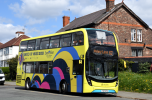TheGrandWazoo
Veteran Member
I'm not convinced by that argument TBH.I think this might be because Arriva tend to operate in less prominent areas that don’t get as much attention by enthusiasts, they tend to operate in more secondary areas in between the biggest places
Drawlane/British Bus was headed up by a convicted felon in Dawson Williams, and was always financially under-resourced with a need to expand. When Cowie bought them, they were able to rebrand to Arriva. It had new management at the top, and there was definite new vehicle investment. Arguably, the rebrand enabled a long needed rationalisation of brands and whilst many may have mourned the loss of some identities (like Northumbria or West Riding), there was a mess in the North West (North Western, Bee Line, Leigh Line) and some that were hardly paragons of quality (Clydeside, Crosville Wales). So it was a fresh new look.
Contrast that with First Bus that had been created a year or two earlier. They too had a motley collection of firms yet continued to buy up businesses. There wasn't a stage where it felt that they were really tackling the group's issues consistently, spending on expansion and continuing to buy fleets that needed major investment e.g. GM Buses, Cawlett. Then there were other instances like the over-centralisation of the business (see central Scotland) before compounding things with the Laidlaw purchase came, plunging First into an abyss of underinvestment in UK Bus. Against those travails, the decline of Arriva didn't really register perhaps?
The problem was that, as evidenced on this forum, some people were still banging on about First's culture of the Lockhead era when the man was long gone and the culture had clearly changed. People just kept going back to the old favourites and still hadn't noticed Arriva's continued decline; it was like picking at an old scab and ignoring the fresh wound on the other leg!
For me, it was obvious as my native Arriva North East was perhaps one of the most pronounced declines. Steve Noble managed it on a shoestring with virtually no new vehicles for six years and continued depot closures and schemes aimed at rationalising the network and PVR (see Viva Durham and Viva Teesside). This is a corporate approach of trimming services and fleets and then realising that a depot overhead couldn't then be justified, so close the depot and cede all but a few routes. That approach is still evident now.

